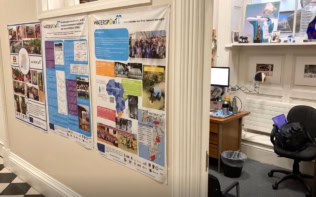A new breed of café is spreading across France - les cafés scientifiques and bars des sciences. Topics up for discussion over a glass of Bordeaux include France's nuclear policy, radiation in the universe, and perhaps inevitably, the science of wine. Inspired by the famous cafés philosophiques, les cafés are now starting up all over France and in April the first national meeting took place in Lyon.
French cafés have long been a meeting point for intellectuals. In the 18th century Victor Hugo met fellow revolutionaries at the Procope in Paris, and in the 1950s groups of existentialists, including Jean-Paul Sartre and Albert Camus, gathered in the Parisian cafés Flore and Les Deux Magots. Today, the French are discovering what physicists have always known: le café is also an ideal place to discuss science.
The new cafés scientifiques attract scientists and non-scientists alike to talk about the latest research in a convivial atmosphere. The movement is supported by the French Physical Society (SFP), who held the first bar des sciences at their annual congress in 1997. “It is nothing like a conference, ” insists Pablo Jensen, physicist at the University of Lyon and organizer of the local café. Most cafés consist of discussions on a theme, with some invited contributions and much informal comment from table to table.
Yves Sacquin, a physicist at Saclay and also president of the SFP particle-physics group, says the ambience interests people who are not in contact with science on a daily basis. Sacquin participated in a café scientifique at this year’s international Paris book fair and said he was impressed by the range of questions he received. Indeed, both scientists and non-scientists learn from the experience. “It is important for both, ” says Gianni Giardino, café organizer and physicist at the Paris University Jussieu. “Scientists learn about the worries of society and the perception of risk, and non-scientists come both to be informed and to dream. Fundamental science can be a bit like magic to them.”
Giardino says that physicists can have trouble replying to questions posed in the cafés. “They are very, very careful about what they say because they have a colleague sitting just next to them!” But Jensen says that non-scientists learn a lot about the reality of research: “People see that scientists are not devils, but that they are not gods either.” Giardino agrees: “When a scientist does not know the answer, that pleases the public.”
Cafés scientifiques are spreading. There are now 12 in France, one in Geneva, and two in the UK at Leeds and Nottingham. Indeed, the Leeds group has followed the French in more ways than one: they meet each month at the café In Vino Veritas.



